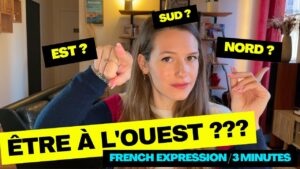🇫🇷 In this video, I present you the 25 essential French vocabulary words to know if you want to learn French. This video is intended for beginners in learning French. The French expressions and vocabulary presented are easy to memorize and are useful in everyday life in France.
These French words and expressions to help you speak French better. Don't hesitate to use them as often as possible. Speaking French well requires practicing as often as possible, so don't hesitate to do so, even if you make mistakes.
Transcript of the video
Hello everyone, I hope you are well.
I'm back today for a new video on learning French.
Today, we are going to see together 25 expressions, 25 words in French that are essential to know for beginners in French.
The expressions will be very useful if you come to France or to a French-speaking country for vacations, for work or if you plan to come and live in a French-speaking country.
Before you start, remember to activate the English or French subtitles to help you understand all the words in the video.
Let's start right away with the first word.
It may sound very simple, but it's hello.
Bonjour is simply hello in English. When you arrive at the bakery, you have to say hello.
When you send an email, you say hello.
When you pass someone in your building, you say hello, it's a word we use all day long.
The second expression we will see is good day.
The equivalent in English. It can be have a good day.
It is used many times a day.
When you leave a place or finish an email, or when you leave a conversation with someone, you can say good day.
In the evening, we will say goodnight.
In the morning or during the day, we say good morning, in the evening we say good evening.
When you leave someone in the evening to go home or leave a business or end a conversation or email, you can say good night.
Have good evening. Have a good evening.
When we leave a place or when we leave someone, we say goodbye.
Au revoir in English is goodbye or Bye Bye.
Another essential word to know in French, you certainly know it, but politeness is really very important in France.
This word, remember it well, is thank you.
Thank you is simply thank you.
Very often, we will also say thank you so much. Thank you so much.
It's to thank someone for doing something for you.
He did you a favor, he gave you something, for example in a shop at the bakery, when the baker gives you your bread you say thank you very much. Have a nice day. Good bye!
And you can leave the bakery.
Please. The English equivalent of Please can be, please.
It is usually used at the end of a sentence when you ask someone for something.
For example, at the restaurant, I would like a Coke, please.
It is a polite phrase that is added at the end of sentences.
It can also be used to call out to someone. Again if you are in a restaurant and you want to call the waiter, you can say please.
You can hear my voice coming up, I'm talking in a more interrogative way. Please. You use this tone of voice to challenge someone.
When you have caught his attention you can make your request.
Finally, we can also use s'il vous plaît in French instead of voici.
When the waiter comes back with your Coke, he can say please to express that he has fulfilled your request.
You are welcome. You are welcome! Please again, this is a greeting. It has the same meaning as you're welcome.
For example, if you are at the hairdresser's, you can tell the hairdresser thank you, I love my new haircut.
The hairdresser can answer Please.
I'm sorry.
Pardon is the equivalent of Sorry in English. Depending on how you say the word forgiveness, the meaning can be different.
If someone speaks to you and you don't understand what the person is saying in French, you can say sorry in a slightly rising voice.
When you express the word forgiveness in this way. It means that you have not understood.
I'm sorry? And the person will probably repeat, he will understand that you did not understand.
You can also use pardon, if you say it in a more neutral tone, with a voice that goes down more, it is to apologize.
For example, if you are walking down the street and want someone to move over, you can say sorry.
It's a way to apologize, to say I'm sorry so that the person shifts.
You can also use pardon, simply to apologize and say you are sorry.
If you have unintentionally bumped into someone.
You're walking and you've bumped into someone. You can say sorry, I'm sorry.
Excuse me. Excuse me.
Excuse me or excuse-moi if you are addressing someone you know on a first-name basis, excusez-moi is if you are addressing the person on a first-name basis, it is the polite form in French.
Excuse me that's a bit of a synonym for forgiveness, I'm sorry.
Like pardon depending on the intonation, excuse me can mean different things.
Again, if someone is talking to you and you don't understand what they are saying.
If you have a rising voice, excuse me, it means you didn't understand or didn't hear and the person will definitely repeat.
You can also use excuse me if your voice goes down.
Excuse me. To report you, for example, in a restaurant.
A bit like please, you can say excuse me to challenge the waiter, to get his attention and again like sorry, you can use it to say you are sorry if you bump into someone in the street or if you want to pass.
Excuse me, I would like to pass. So you see, excuse me and sorry, it's pretty close.
But like sorry and excuse me in English.
The next word you may already know is yes.
Yes, it's simply yes!
Do you want to say you agree or answer in the affirmative. Yes.
Let's move on to no.
No, you certainly understood it, it is the equivalent of no.
If someone offers you something and you don't want it, it is more polite in French to say non merci rather than simply non.
For example, if a friend asks you if you would like a glass of water?
Instead, say no thanks rather than just no.
That's not very polite. So say no thank you when someone makes you an offer.
My name is Elisabeth.
My name is Elisabeth.
My name is, you use it, followed by your first name.
It is very useful to introduce yourself.
I am.
I am, I am, it comes from the verb to be in the first person singular.
It is the verb that we hear the most in French with the verb avoir.
I am, you can preface that with your first name too.
I am Elisabeth, but also a profession, an adjective, your nationality.
I am Elisabeth, I am Belgian, I am a French teacher and I am very happy today.
I am also quite short. I am 1.64 meters tall.
You see, I am and you can make many sentences with this expression.
How are you? How are you ? How are you ?
You simply want to ask someone how they are doing.
If he is well, if he is not well, if he is in a good mood, if he is in a bad mood.
How are you? You use it if you are on a first-name basis with the person, that it is a close friend.
How are you going to use it if you are polite to the person, with someone you don't know very well or someone, for example, higher up in the hierarchy, at work, someone you respect.
In general, older people in France are called "vous".
I'm fine.
I'm fine, that's the answer to how are you? How are you doing?
I'm fine is I feel good, I'm happy, I'm in a good mood.
I am 30 years old. I am thirty years old.
This expression, I am ... years old, you use it to talk about your age.
Be careful because in English, we use the verb to be. I am.
Whereas in French, it is the verb avoir.
I have and I have not. We saw the verb to be, I am, a little earlier, let's move on to the verb to have.
Again, this is a phrase that you will use very often to talk about everyday things, to talk about the very simple things in life.
I have a car or I don't have a car, I go to work by bus. I have, I haven't.
I would like. I would like.
It is the conditional form of the verb to want.
In French, you should say je voudrais and not je veux to be polite. I would like a coffee. I would like a coffee.
I like, I like.
I like, it's a formula at the beginning of a sentence that will be very useful to introduce yourself, to express your personality, to talk about what you like.
For example, you can say I like followed by food, followed by an activity followed by people. For example, I can say I like sports, I like dogs and I like Donuts.
I don't understand.
This sentence will be very useful if you are a beginner in French and you are going to a French-speaking country.
I don't understand, you can say it to someone you are talking to to tell them that you don't understand what they are saying.
It's hard for you to understand the French sentence that someone just said to you. I don't understand it.
Bon appétit, bon appétit. This is a phrase that is said very often in France. You certainly know that the French love to eat, the culture of food and especially good food is very important in France.
When you are about to start a meal, you can say bon appétit.
It's the English equivalent of enjoy your meal.
Still in the same lexical field after bon appétit, let's go to health.
Health is a word that we also hear very often in France. It's when we start drinking a glass, we clink glasses between two or more people and we say health!
It is the equivalent of cheers in English.
I don't know. I don't know.
This is a phrase that can also be very useful to you.
Because when someone asks you a question, for example, if someone asks you for directions on the street, you can say I don't know.
Or when you are asked a question to which you don't have the answer, you can say I don't know.
And finally, let's move on to the last expression that you absolutely must know if you are a beginner in French.
It looks like goodbye.
When we say goodbye it means you are leaving.
But when you say see you later, you're leaving, but you're going to come back or you're going to see the person later in the day. See you later.
And that's it for this video. 25 essential expressions if you are a beginner in French.
If you liked this video, don't forget to put a like.
If you are new to the channel, remember to subscribe and activate the bell to receive all the videos in order to continue learning and progressing in French.
See you soon.
Good day, goodbye.








